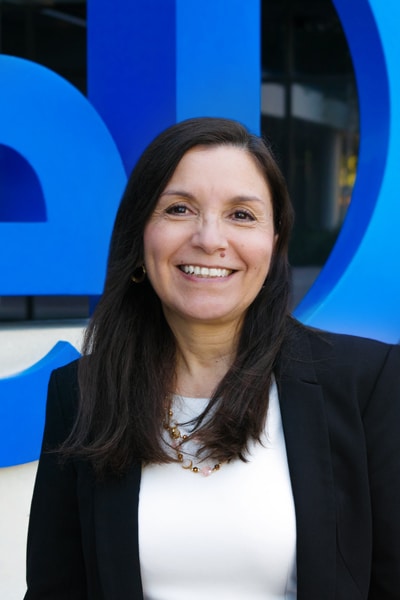|
Getting your Trinity Audio player ready...
|
The Intel Achievement Award (IAA) is the highest honor an individual or small team can receive from the company. The award recognizes innovations and results that have had the greatest impact on the company’s top business priorities. It’s the top of the mountain, an award demarking what must be a career highlight for its winners, and a recognition from one of the best-known technology companies in the world that a small, select group of its employees has done work worthy of being singled out of a population of 110,000. Isaura Gaeta has won it five times.
The VP of security research in Intel’s product assurance and security group, Gaeta has been an Intel employee for the bulk of her career, dating back to the early days of the Pentium processor in 1990. Gaeta has led semiconductor labs and manufacturing facilities; she’s led systems and platform engineering teams; and, in June 2018, she was charged with her most novel position yet: overseeing a team of hackers whose job isn’t to create new products across Intel’s product lines but to figure out how to break or bypass them.

Admittedly, there’s something amusing about imagining Gaeta on the same playing field as Viola Davis in Suicide Squad or Lee Marvin in The Dirty Dozen. The tough, no-nonsense leader of a ragtag group of misfits—that’s not Gaeta’s vibe in the least. And it’s not how she’s approached her new role. “I’m really enjoying this, and for so many different reasons,” the VP says. “This work is from a totally different perspective than I am used to, but this opportunity has taken me to the next level of how I approach talent development, diversity, and inclusion.”
This is why Gaeta has won the IAA so many times. She doesn’t just face down a new challenge; she goes looking for it.
A Challenge Around Every Corner
Some of the earliest challenges Gaeta faced weren’t in her career at all. As a high school student, Gaeta received a memorable response from her guidance counselor when they learned she wanted to apply to Stanford. “My advisor basically told me that I would never get into Stanford,” the VP remembers. “They thought a ‘girl like me’ should take easier classes.”
Luckily, Gaeta didn’t listen. She was drawn to math and science classes from an early age, in part because she didn’t speak any English in her first five years. She got into Stanford, but she had no idea how she might apply her dual loves except as either a science teacher or medical professional.
“It wasn’t until I started university that I really learned about the field of engineering,” Gaeta says. “It just felt like an opportunity to solve some of the world’s toughest problems while applying math and science.” Gaeta specialized in semiconductor processing, combining chemistry, physics, material science, computer science, and computer simulation.
But another rude awakening was around the corner. “University was also where I realized that there really weren’t a lot of women, let alone Latina women, in this space,” Gaeta explains. “I’m just proud that despite the many times where it seemed daunting, I kept moving forward. I didn’t give up.”
Opening the Door
The isolation of often being the only Latina in her orbit has led Gaeta to double down on diversity and inclusion efforts far before they became prominent in the corporate world. Gaeta served as an advisor for the Guiding Concilio at El Centro Chicano y Latino Cultural Center Stanford, her alma mater. She also served on the board of directors for both the Women in Engineering ProActive Network and the Hispanic Foundation of Silicon Valley.
“I’ve always had the feeling that many people opened doors for me,” Gaeta explains. “There’s so much need in the Latino community to help students find out about engineering, to help them access scholarships, and to provide mentors who can show them that yes, you can do this too.”
Gaeta’s appreciation for diversity and inclusion isn’t just confined to the Latino community. It’s also been incredibly important to her latest security research role. “My team approaches life in a very different way, with a sort of critical look at how systems work and where weaknesses lie,” Gaeta explains. “They can be very challenging at times when it comes to rules that we put in place.
“They will definitely poke at those rules,” she continues, laughing. “As a leader, using my inclusion skills to reach out to my hacker community and help them feel contributive in a way that fits within our industry has been both very challenging and very rewarding.”
The reward, Gaeta says, comes from helping relay great ideas and provide means for different personalities and learning styles to really shine. “That’s one of the things I most love about positions of leadership,” Gaeta reflects. “I have learned how to navigate the corporate world, and now I can open doors and provide opportunities for this upcoming talent. It’s so rewarding to see people flourish.”
The Real Value of Technology
According to Isaura Gaeta, great technology isn’t just about how small a phone can be or the next big app. There is a far bigger benefit when tech is done right. That’s why Intel’s purpose is to create technology that enriches the lives of every person on Earth.
“It’s so important to look at how technology can act as the great equalizer and how, with the right tech, opportunities can be provided that are absolute game changers for people,” the VP explains. “The pandemic has shown us that there are still people who don’t have internet, who don’t have the devices they need to do their schooling. That motivates me to work toward solutions and answer questions like, ‘How do we connect with these people? How do we get kids what they need?’
“There’s so much to do, and technology can improve access to quality education,” she adds. “I will be involved in the nonprofit space until I can no longer physically do it.”

